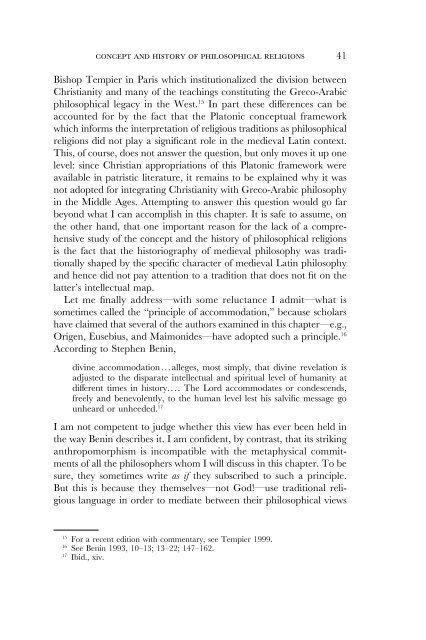40 carlos fraenkelChristianity—most prominently by Marsilio Ficino (d. 1499), the maintranslator of Platonic writings from Greek to Latin.From the point of view of my project the question why the interpretationof Christianity as a philosophical religion did not take holdin medieval Christian thought is, of course, one of the most interestingquestions yet to be explored. The fact that Christian philosophers inlate antiquity did propose such an interpretation shows that there isnothing in the nature of Christianity that would preclude it from theoutset. There are, moreover, some similarities between the intellectualtraditions examined in this chapter and the medieval Latin West.Figurative interpretation, for instance, played an important role in bothcontexts, even though it took on different forms and served differentpurposes. 13 But these similarities remain on the surface and should notprevent us from seeing the substantive differences. While the relationshipbetween philosophy and Christianity in the Middle Ages took ona wide range of shapes, the two always remained identifiable as twodistinct traditions. Latin Averroists, for instance, who tried to work outa consistent philosophical position on the basis of Aristotle and Averroes,reached the conclusion that a number of their core philosophicaldoctrines contradicted Christian beliefs. 14 This is the exact oppositeof the position advocated by Averroes with respect to philosophy andIslam. The tensions between philosophy and Christianity culminatedin the condemnation of 219 philosophical and theological theses by13Thus the “allegorical sense” is one of the four senses of Scripture assumed bymedieval Christian exegetes. See e.g., Hugo of St. Cher (d. 1263): Postillae in universabiblia secundum quadruplicem sensum: historicum, allegoricum, moralem et anagogicum (Glosseson the entire Bible according to the fourfold sense: historical, allegorical, moral, andanagogical). But as far as I can see, this exegetical program has little in common withthe approach adopted by proponents of a philosophical religion. The important differencedoes not concern the number of levels of meaning. While I will normally speak ofonly two levels—the allegorical and the literal—this is to some extent a simplification.Origen 1913, for instance, distinguishes between three levels of meaning (Book 4) andso does Averroes 2001 (see e.g., Arabic and English 8). Al-Fârâbî suggests a scale ofmeanings that gradually approach scientific knowledge (see al-Fârâbî 1985, ch. 17,sec. 3. Section numbers refer to both the Arabic and the English trans.). The crucialdistinction, however, is the one between the philosophical and the nonphilosophicalunderstanding of religion, whereby the nonphilosophical understanding is often furthersubdivided into levels that gradually approach the philosophical understanding. Theassumption governing this approach is that the true core of religion coincides withphilosophy. As I will argue in what follows, this assumption was not shared by Christianexegetes in medieval Europe.14See e.g., philosophers like Boethius of Dacia (fl. ca. 1275) or Siger of Brabant(d. ca. 1284). See Boethius 1987 and van Steenberghen 1977, respectively.
concept and history of philosophical religions 41Bishop Tempier in Paris which institutionalized the division betweenChristianity and many of the teachings constituting the Greco-Arabicphilosophical legacy in the West. 15 In part these differences can beaccounted for by the fact that the Platonic conceptual frameworkwhich informs the interpretation of religious traditions as philosophicalreligions did not play a significant role in the medieval Latin context.This, of course, does not answer the question, but only moves it up onelevel: since Christian appropriations of this Platonic framework wereavailable in patristic literature, it remains to be explained why it wasnot adopted for integrating Christianity with Greco-Arabic philosophyin the Middle Ages. Attempting to answer this question would go farbeyond what I can accomplish in this chapter. It is safe to assume, onthe other hand, that one important reason for the lack of a comprehensivestudy of the concept and the history of philosophical religionsis the fact that the historiography of medieval philosophy was traditionallyshaped by the specific character of medieval Latin philosophyand hence did not pay attention to a tradition that does not fit on thelatter’s intellectual map.Let me fi nally address—with some reluctance I admit—what issometimes called the “principle of accommodation,” because scholarshave claimed that several of the authors examined in this chapter—e.g.,Origen, Eusebius, and Maimonides—have adopted such a principle. 16According to Stephen Benin,divine accommodation . . . alleges, most simply, that divine revelation isadjusted to the disparate intellectual and spiritual level of humanity atdifferent times in history. . . . The Lord accommodates or condescends,freely and benevolently, to the human level lest his salvific message gounheard or unheeded. 17I am not competent to judge whether this view has ever been held inthe way Benin describes it. I am confident, by contrast, that its strikinganthropomorphism is incompatible with the metaphysical commitmentsof all the philosophers whom I will discuss in this chapter. To besure, they sometimes write as if they subscribed to such a principle.But this is because they themselves—not God!—use traditional religiouslanguage in order to mediate between their philosophical views15For a recent edition with commentary, see Tempier 1999.16See Benin 1993, 10–13; 13–22; 147–162.17Ibid., xiv.



